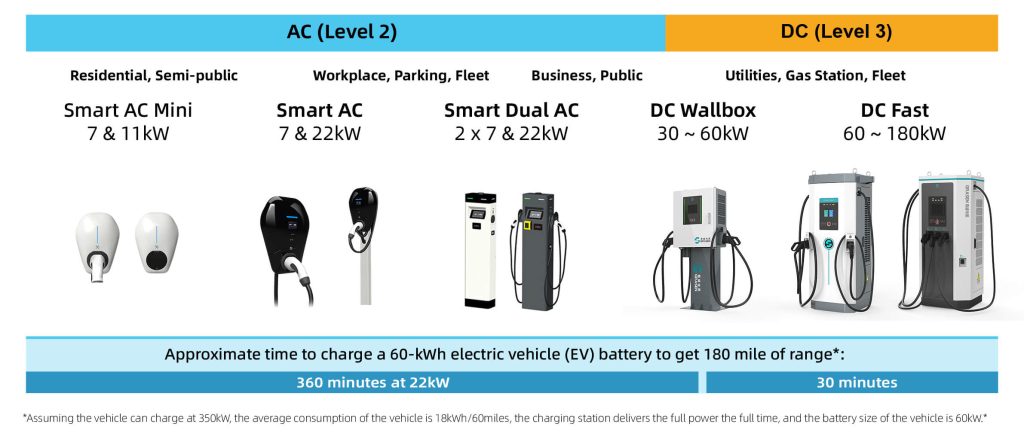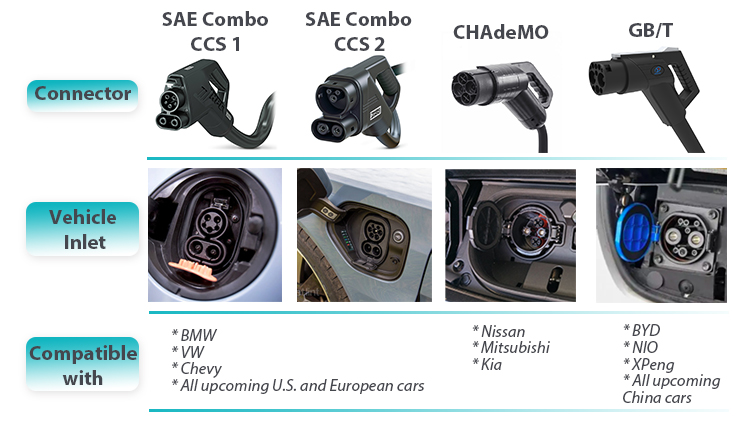Time:
In preparation for an emissions-free future, a lot of major automakers have publicly announced commitments to the development of electric vehicles. With the growing popularity of electric vehicles (EVs), finding a reliable and efficient EV charger is becoming more important than ever. But with so many options available, choosing the right EV charger can be overwhelming. Here are some key factors to consider about how to choose an EV charger that suits your needs.
The charging speed of an EV charger is one of the most important factors to consider. It is usually measured in kilowatts (kW), and it determines how quickly your EV will charge. The higher the kW rating, the faster the charging speed. (Learn about the 5 Factors that Affect the EV Charging Speed)
Besides, EV chargers have three levels that correspond to charging speed: Levels 1, 2, and 3.

Level 1 charger is widely applied at home, the average charging period is 10 to 20 hours.
Level 2 chargers can be used for both residential and commercial. A standard Level 2 charger with 32-amp output use 220-240 volts and charge a vehicle in an average of four to six hours.
Level 3, or DC fast chargers, are often used in public to provide high-speed charging services. DC fast chargers can boost a vehicle's battery to 80% within 30 minutes.
You may want to know more info. about "Different types of ev chargers".
Before selecting an EV charger, EV drivers need to consider the battery size of their EVs and how frequently they want to charge it. For charging station owners, the charging speed is especially important if they want to double their vehicle servicing and generate more revenue.
There are several connector types for EV chargers. CCS, CHAdeMO, and GB/T for DC fast charging, and Type 1, or Type 2 for AC charging.

It's important for EV drivers to choose an EV charger that is compatible with their EV's connector type. EV charging station owners need to know which charging standard is most commonly used in their local area.
It's worth mentioning that some EV chargers such as Grasen's dual ports and three ports series have the function of simultaneously charging two or three vehicles with different charging standards. This will help to save the total cost and make full use of energy.
The cost of an EV charger varies depending on the brand, charging speed, and features. Determine your budget and consider the long-term costs of the charger, including installation fees, maintenance costs, and electricity costs. Some EV chargers also come with additional features, such as Wi-Fi connectivity or smart charging capabilities, which may increase the cost.
Learn more about "commercial ev charging stations cost"
Some EV chargers come with additional features, such as network connection, OCPP capability, dynamic load balancing, and an EV charging station management system.
For residential applications, these features can be beneficial if users want to monitor the charging status remotely or schedule charging during off-peak hours to save on electricity costs. Consider which features are important to you and whether they justify the additional cost.
For commercial applications, these functions are necessary for operators to manage chargers and users, and realize smart charging & energy scheduling.
Choose an EV charger from a reputable brand, or choose products that are approved by the industry certification such as CE, or UL. Cause reliable suppliers usually offer a warranty and customer support.
Normally Grasen offers a 1-year warranty, and it's extendable to 5 years.
In conclusion, choosing the right EV charger requires careful consideration of your charging needs, budget, and additional features. It may seem like a complex process, and Grasen is always ready to help.
Submit Request